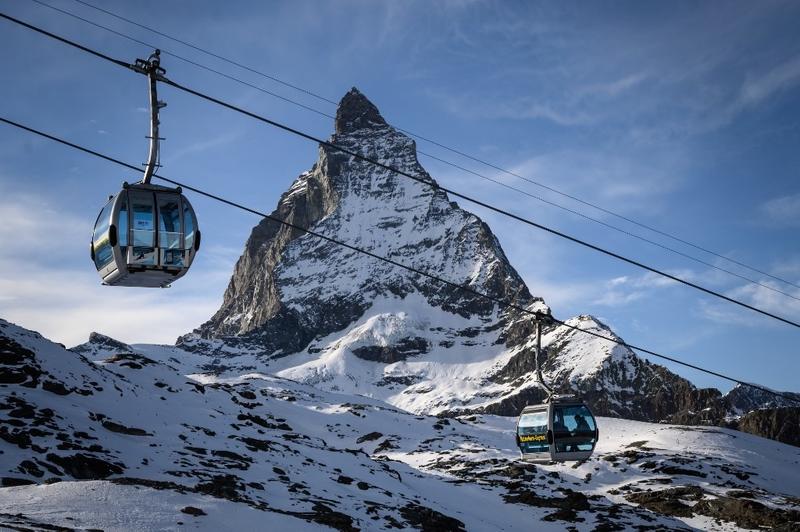 This Nov 28, 2020, photo shows gondolas in front of the Matterhorn mountain above the ski resort of Zermatt in the Swiss Alps. (FABRICE COFFRINI / AFP)
This Nov 28, 2020, photo shows gondolas in front of the Matterhorn mountain above the ski resort of Zermatt in the Swiss Alps. (FABRICE COFFRINI / AFP)
New research shows that climate change could result in the loss of up to 92 percent of glaciers in Europe's Alps mountain range by the end of this century.
Climate change is a global issue. It affects us all and one of its most immediate impacts is on glaciers and ice sheets.
Neil Glasser, professor at Aberystwyth and the project coordinator
The region features 4,000 glaciers and includes popular skiing destinations such as the Klein Matterhorn in Zermatt, Switzerland, the Hintertux Glacier in Austria and the La Grand Motte Glacier in Tignes, France.
Those ski resorts' glaciers would be mostly gone by 2100, according to the findings, published in the journal Climate Dynamics. The paper noted there would also be effects for water storage, runoff and Alpine ecosystems.
ALSO READ: Climate change report: COVID-19 will not slow global warming
Led by researchers from Aberystwyth University in Wales, the EU-funded Change project covers the entire European Alps region. It is based on 200 years of climate records and forecasts from 1901 to 2100, the BBC reported.
Neil Glasser, a professor at Aberystwyth and the project coordinator, said the research shows that Alpine glacial response to climate change will be "rapid and highly variable".
"Climate change is a global issue. It affects us all and one of its most immediate impacts is on glaciers and ice sheets. Glaciers are the 'canary in the mine' for climate change, their retreat is so fast," Glasser said. "This dramatic disappearance of glaciers from the Alps is one of the most immediate and visible effects."
Glasser said glaciers influence everything from ecosystems to human populations. He added one of the biggest impacts on the local population in the Alps is on water resources and the change in melt and runoff, which will have implications for drinking water, crops, irrigation, sanitation and hydro power.
Researchers said findings from the Change project also provide insights to similar mountain glaciers globally.
READ MORE: Report: More than 1b people face displacement by 2050
"The results contribute to a better understanding of how glaciers in the European Alps are responding to a changing climate," said Glasser. "If, as we expect, we see these patterns replicated on a global basis, the retreat of mountain glaciers will have significant implications for sea level rise."
Manja Zebre, first author of the paper in the journal, said there are plans to apply the modeling approach used in the project to other glaciers across the world, such as those in the mountains of the Andes in South America, the Himalayas in Asia, and the Rockies in North America.


